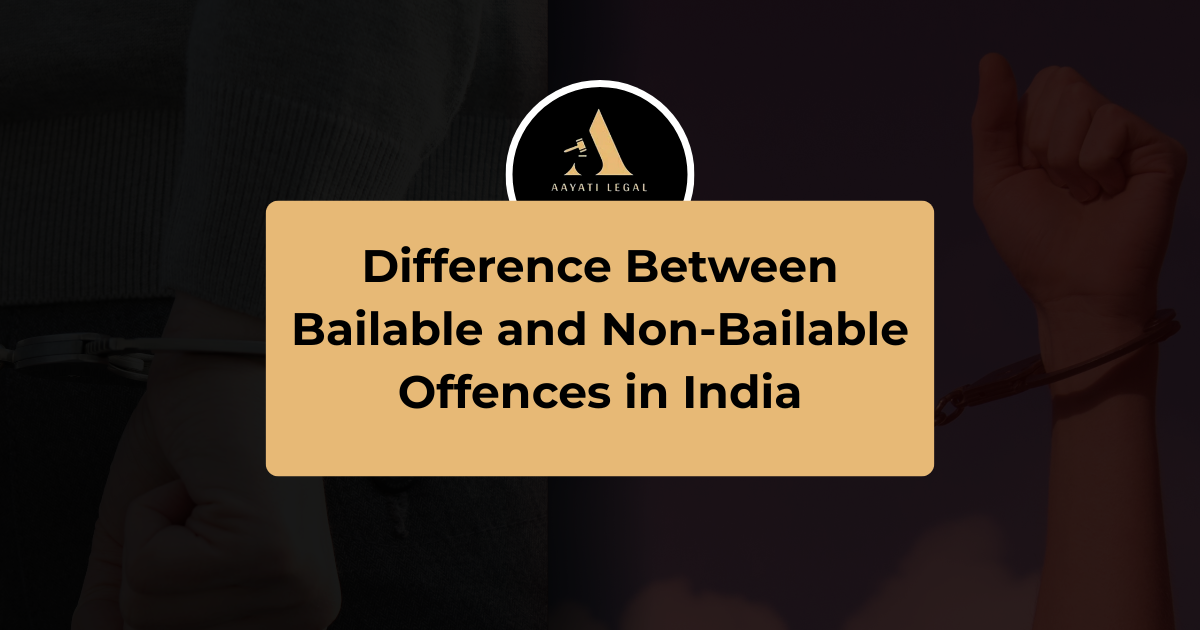
Difference Between Bailable and Non-Bailable Offences in India
Difference Between Bailable and Non-Bailable Offences in India
In India, criminal offences are broadly classified into two categories: bailable and non-bailable offences. This classification holds vital importance in the legal system as it directly influences a person’s ability to secure bail and the nature of the offence itself. For anyone navigating a criminal charge or seeking legal assistance, understanding this distinction is fundamental.
At Aayati Legal's Criminal Litigation Practice, we have extensive experience handling both bailable and non-bailable offences, offering strategic legal representation in Delhi's complex criminal justice system.
Understanding Bailable Offences
A bailable offence is one where bail is granted as a matter of right. The accused has the legal entitlement to be released from custody upon furnishing bail. These are generally considered to be less severe offences and include crimes that do not pose a serious threat to public safety.
Examples of Bailable Offences
- Simple hurt (Section 323, IPC)
- Public nuisance (Section 268, IPC)
- Bribery by a public servant (Section 171E, IPC)
- Defamation (Section 500, IPC)
- Attempt to commit suicide (Section 309, IPC)
In such cases, the police or court has to grant bail if the accused applies for it. The process is straightforward, and a reliable legal counsel ensures the bail process is smooth.
Understanding Non-Bailable Offences
In contrast, a non-bailable offence is one where bail is not a right but a discretion granted by the court. These are more serious offences involving grievous crimes, and the court examines the nature of the offence, the criminal history of the accused, and other relevant factors before granting bail.
Examples of Non-Bailable Offences
- Murder (Section 302, IPC)
- Rape (Section 376, IPC)
- Kidnapping for ransom (Section 364A, IPC)
- Dowry death (Section 304B, IPC)
- Criminal conspiracy (Section 120B, IPC)
Obtaining bail in these cases requires strategic legal representation and proper documentation. The court’s decision depends on the seriousness of the charges, prior criminal records, evidence against the accused, and the possibility of tampering with evidence or absconding.
Legal Procedure and Bail Application
Under the Code of Criminal Procedure (CrPC), the procedure for granting bail differs based on the type of offence. For bailable offences, the accused may be released by the police upon arrest. In non-bailable cases, the bail application must be filed before a Magistrate or Sessions Court.
Our team at Aayati Legal’s White Collar Crime division also handles intricate cases involving financial frauds and criminal breaches of trust that often fall under non-bailable categories.
What Courts Consider in Non-Bailable Cases
- Nature and gravity of the offence
- Evidence against the accused
- Possibility of fleeing justice
- Likelihood of influencing witnesses
- Past criminal record
Why Legal Representation is Crucial
Whether the charge is bailable or non-bailable, expert legal counsel is critical. The procedural nuances and judicial discretion require careful legal navigation, especially in non-bailable scenarios where one’s liberty is at stake.
Our Private Client Services at Aayati Legal are tailored to support individuals entangled in criminal litigation, ensuring confidentiality, diligence, and a results-driven approach.
Impact on Accused and the Legal Strategy
A legal strategy varies significantly between bailable and non-bailable cases. For bailable offences, a strong bail application and minimal documentation can ensure release within hours. In non-bailable matters, pre-arrest bail, anticipatory bail, or regular bail must be skillfully handled.
We also offer strategic support through our Dispute Resolution team in overlapping civil-criminal matters such as fraud and breach of contract leading to criminal proceedings.
Recent Trends in Judicial Interpretation
Indian courts have increasingly emphasized the principle that ‘bail is the rule, jail is the exception’. However, this is balanced with public interest and the seriousness of the offence. Judges often view economic offences like financial fraud or money laundering with heightened scrutiny, though these may not be violent crimes.
Conclusion: Know Your Rights, Take Legal Action
The distinction between bailable and non-bailable offences significantly impacts how your criminal matter will be handled. In both cases, early consultation with experienced criminal lawyers can change the course of the proceedings. At Aayati Legal, we combine our litigation strength with strategic foresight to protect our clients’ rights and reputations.
If you or someone you know is facing a criminal charge, don’t delay. Contact us at 8800184922 or visit our Criminal Litigation Practice page for dedicated legal support.
Website: www.aayatilegal.com

Comments
Leave a Comment